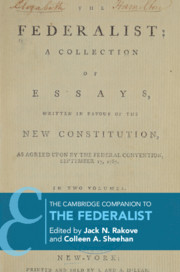Book contents
- The Cambridge Companion to The Federalist
- Other Volumes in the Series of Cambridge Companions to Philosophy
- The Cambridge Companion to The Federalist
- Copyright page
- Contents
- Contributors
- Acknowledgments
- Abbreviations
- Introduction
- 1 Publius and the Anti-Federalists:
- 2 John Jay, The Federalist, and the Constitution
- 3 “A Vigorous National Government”: Hamilton on Security, War, and Revenue
- 4 “The Known Opinion of the Impartial World”
- 5 The Federalist’s New Federalism
- 6 The Political Psychology of Publius
- 7 Montesquieu, Hume, Adam Smith, and the Philosophical Perspective of The Federalist
- 8 Madison’s Republican Remedy
- 9 The Republicanism of Publius
- 10 “The Interest of the Man”: James Madison’s Constitutional Politics
- 11 Politics Indoors and Out-of-Doors
- 12 “The Cool and Deliberate Sense of the Community”
- 13 Publius on Monarchy
- 14 The Genius of Hamilton and the Birth of the Modern Theory of the Judiciary
- 15 Publius’s Political Science
- 16 The Republican Form of Government in The Federalist
- Index
- Other Volumes in the Series of Cambridge Companions to Philosophy
5 - The Federalist’s New Federalism
Published online by Cambridge University Press: 28 February 2020
- The Cambridge Companion to The Federalist
- Other Volumes in the Series of Cambridge Companions to Philosophy
- The Cambridge Companion to The Federalist
- Copyright page
- Contents
- Contributors
- Acknowledgments
- Abbreviations
- Introduction
- 1 Publius and the Anti-Federalists:
- 2 John Jay, The Federalist, and the Constitution
- 3 “A Vigorous National Government”: Hamilton on Security, War, and Revenue
- 4 “The Known Opinion of the Impartial World”
- 5 The Federalist’s New Federalism
- 6 The Political Psychology of Publius
- 7 Montesquieu, Hume, Adam Smith, and the Philosophical Perspective of The Federalist
- 8 Madison’s Republican Remedy
- 9 The Republicanism of Publius
- 10 “The Interest of the Man”: James Madison’s Constitutional Politics
- 11 Politics Indoors and Out-of-Doors
- 12 “The Cool and Deliberate Sense of the Community”
- 13 Publius on Monarchy
- 14 The Genius of Hamilton and the Birth of the Modern Theory of the Judiciary
- 15 Publius’s Political Science
- 16 The Republican Form of Government in The Federalist
- Index
- Other Volumes in the Series of Cambridge Companions to Philosophy
Summary
Judging from the title that Publius gave his collection of essays, the label that defenders of the proposed Constitution took for themselves, and the label that became attached to their opponents, federalism seems to have been the central issue in the debate over the proposed Constitution. Yet the labels themselves are often the source of confusion when speaking of the debate over its ratification. One form the confusion takes is the puzzlement that derives from the fact that the Constitution’s opponents, the Anti-Federalists, are usually characterized as a group who sought a more federal constitution than the nationalist-leaning document the so-called Federalists were sponsoring. It might seem that the parties were strangely mislabeled, a feeling shared not only by many modern readers, but by some of the participants in the debate themselves. So Melancton Smith, a leading Anti-Federalist, was reported to have said in the New York Ratifying Convention, in reply to a speech by a leading Federalist: “He hoped the gentleman would be complaisant enough to exchange names with those who disliked the Constitution, as it appeared … that they were Federalists, and those who advocated it Anti-Federalists.” The confusion over names was certainly a natural one, but the names that have stuck were not so inappropriate or so much a usurpation as critics like Smith averred. All the parties to the debate, even Anti-Federalists like the Federal Farmer, thought by many to be Smith, agreed that a federal system had two major components: member states and a “federal head” or general government for the whole. Since a federal system was normally contrasted with a unitary or consolidated system like France, the federal system was thought to be the one with decentralized authority, that is, with more authority in the member states relative to the greater authority in the general or central government of a unitary system. Thus, one could plausibly be labeled a federalist if one were in favor of greater authority in the member units relative to the federal head (as the Anti-Federalists were). But one could just as well be a federalist for favoring the strengthening of the federal head or central government (as the Federalists did). Given the circumstances of the debate over the Constitution, its advocates even had a somewhat stronger claim to the label, despite the understandable ambiguities. The pro-Constitution forces came before the country with a proposal to strengthen the federal head and thus were in this sense Federalists.
- Type
- Chapter
- Information
- The Cambridge Companion to The Federalist , pp. 164 - 193Publisher: Cambridge University PressPrint publication year: 2020
- 1
- Cited by



